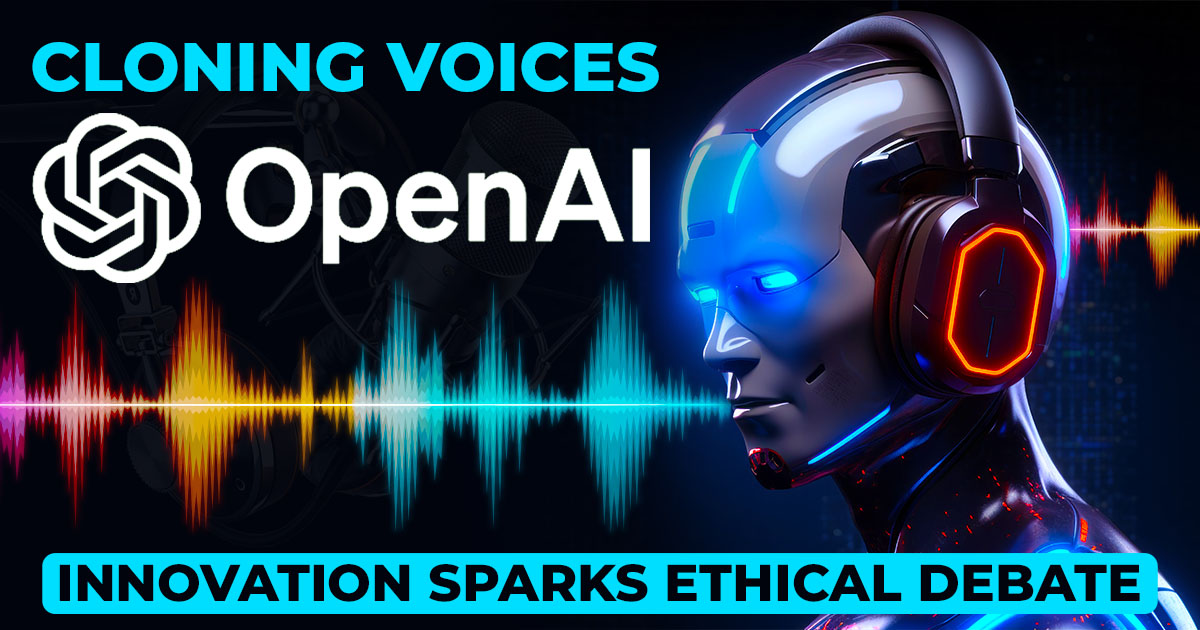Imagine creating an exact match of your voice from just a 15-second audio sample—all with OpenAI’s voice cloning tool, Voice Engine. But the universal truth remains that every coin has two sides. If one side is a boon, the other is a bane.
The need of the hour is that technological advancements should strike a delicate balance with ethical integrity. To ensure this, the OpenAI company is placing great priority on transparency and accountability.
Though it has yet to be released and is only available to some testers, this voice cloning tool is going to revolutionize the world. However, before looking at the ethical debate it has ignited, let’s first understand what OpenAI Voice Engine is.
What is an OpenAI Voice Engine?
OpenAI Voice Engine represents a significant advancement in natural language processing (NLP) along with artificial intelligence (AI). It is a system designed to generate human-like speech from text and a 15-second-long voice recording input.
Based on deep learning algorithms and neural network architectures, the Voice Engine can produce remarkably realistic voices, capable of generating various accents, tones, and even emotions. This technology holds the promise of revolutionizing industries such as customer service, entertainment, accessibility, and education, among others.
The Advantages of Voice Engine
More than over 100 million people from 185 countries use ChatGPT weekly in order to learn something new, get creative inspiration, and get answers to their questions, just months after launching its video generator Sora. Now, OpenAI is on a mission to bring AI into the voice. It is not the first company to bring this innovation to the market, but no wonder OpenAI has already captured the attention even before releasing it.
They have called it a “beneficial AI” that is developed for various noble goals. Some of the benefits of Voice Cloning AI may be:-
Accessibility to Patients and Disabilities:
Voice Engine has the power to break down barriers for individuals with disabilities, providing them with improved access to information and services through voice interfaces.
Personalization to businesses:
Businesses can utilize Voice Engine to create unique experiences for their customers, offering personalized recommendations, assistance, and support through natural language interactions.
Scalability:
Voice Engine enables the automation of repetitive tasks, allowing organizations to streamline operations and scale their services efficiently.
Multilingual Support:
This Voice-cloning AI has the ability to generate speech in multiple languages and with different accents. Voice Engine facilitates communication across diverse linguistic communities, enabling global communication
Entertainment:
Voice-enabled technologies powered by OpenAI Voice Engine can drive innovation in various sectors, ranging from virtual assistants and interactive storytelling to language learning platforms and immersive gaming experiences.
The Disadvantages of Voice Engine
Calling it for noble goals, but it will go beyond it, if not now, then shortly. For instance, text-to-speech software or tools were developed to help blind people; however, we all use applications like Siri, Google Assistant, and GPS navigation systems.
Recently, Elon Musk has launched its Neuralink chip to help paralyzed ones, but there is no doubt that he wants to implant it in various human brains. Likewise, this Voice Engine will start with a noble cause but turn out to be a business strategy.
Here are some of the disadvantages of Voice Engine:
Ethical Concerns:
The use of AI-generated voices raises ethical questions regarding authenticity, manipulation, and consent. There is a risk of misuse, such as creating deceptive content or impersonating individuals without their consent.
Security and Privacy Risks:
Voice Engine collects and processes vast amounts of audio data, raising concerns about privacy and data security. Unauthorized access or misuse of this data could compromise user privacy and confidentiality.
Quality and Accuracy:
While the Voice cloning tool has made significant strides in generating natural-sounding speech, it may still exhibit limitations in terms of voice quality, intonation, and pronunciation, leading to potential misunderstandings or misinterpretations.
Dependency on Technology:
Overreliance on Voice cloning tools and similar AI technologies may lead to a loss of human skills and interaction, exacerbating social isolation and disconnection.
Job Displacement:
The widespread adoption of voice-enabled AI systems could result in job displacement, particularly in industries heavily reliant on voice-based interactions, such as call centres and customer support services.
Innovation and Ethical Integrity
“Precaution is better than cure,” as the wise ones say. No matter what advancements a society makes, responsible deployment and usage are also important. Strong regulatory frameworks are very important when it comes to mitigating the risks and staying safe against the unethical uses of AI.
Ethical Guidelines:
Organizations developing AI technologies must adhere to stringent ethical guidelines and principles, ensuring transparency, fairness, and accountability throughout the product life cycle.
User Consent and Privacy:
Users should have full control over their data and consent to the collection and use of their voice recordings. Implementing robust privacy measures, such as data encryption and anonymization, can help protect user privacy rights.
Regulatory Oversight:
Governments and regulatory bodies are important for overseeing the responsible use of AI technologies and enforcing compliance with ethical integrity and data protection regulations.
Education and Awareness:
Spreading awareness about AI technologies’ capabilities and limitations is essential for informed decision-making and for differentiating between authentic and AI-generated content.
OpenAI Voice Engine represents a remarkable feat of technological innovation with the potential to transform various aspects of our lives. However, its widespread adoption also poses ethical challenges and risks that must be addressed proactively. By embracing responsible development practices, fostering collaboration across stakeholders, and upholding ethical principles, we can harness the power of AI for the greater good while mitigating its potential for harm.
Also Read : NVIDIA ChatRTX vs ChatGPT

